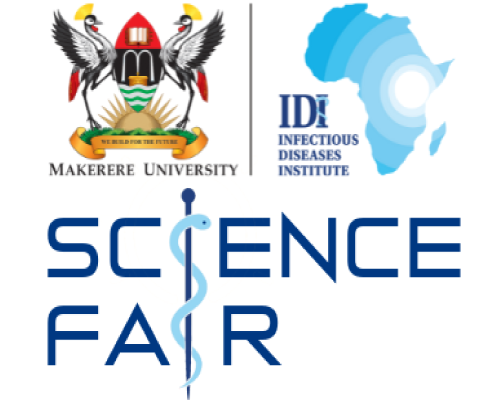SCIENCE FAIR 2024
26th – 27th September 2024
Theme: Innovate. Influence. Inspire
Venue: School of Public Health Auditorium at Makerere University Main Campus and Virtual
Events Speakers
KEYNOTE SPEAKERS
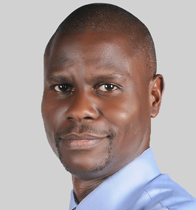
Prof. David Meya, MBChB, MMED, Ph.D.
Dr. David Meya is an Associate Professor of Medicine at Makerere University College of Health Sciences and an Adjunct Associate Professor at the University of Minnesota. He has been involved in clinical research of central nervous system infections and complications, with a focus on HIV Immune Reconstitution Inflammatory syndrome (IRIS). Dr. Meya has led epidemiological and translational research studies as well as randomized clinical trials in prevention and treatment of Cryptococcal Meningitis. Dr. Meya also has a specific interest in public health interventions to prevent meningitis at population level. He has advocated for cryptococcal antigen (CrAg) screening as a strategy to reduce deaths and hospitalizations from cryptococcal meningitis. Dr. Meya chairs the Advanced HIV Disease Technical Working group at the Ministry of Health. He has been the Principal Investigator on NIH R01, CDC U01, and UK MRC grants and continues to be involved in advocacy to improve clinical care and outcomes in a predominantly HIV-infected patient population with limited resources for health focusing on advanced HIV disease.
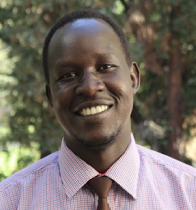
Dr. Jonathan Izudi, MPH, MSc, Ph.D.
He is an NIH Emerging Global Leader and University of California TB Research Advancement Center (UC TRAC) Global Fellow at UCSF. His specialties are in public health and global health. After nearly 11 years of work in HIV, TB, and maternal and child health programs at the national and international levels, he chose a research career path, completing his doctoral studies in 2021 and producing 10 publications (9 pre-graduation vs. 1 post-graduation). He then completed postdoctoral training in HIV and co-infections (IDI Makerere University, Uganda), global health (UCSF, USA), and impact evaluation (UC Berkeley, USA). He largely researches TB and HIV through epidemiological, operational, and implementation research lenses. His methodological and statistical expertise is in systematic reviews and meta-analyses, causal inference, and impact evaluation using randomized and non-randomized approaches. He has presently authored 82 peer-reviewed articles (36 first-authored) and is ranked among the top 150 research scientists in Uganda.

Dr. Andrew D Kambugu, MBChB, MMED, FRCP (London)
Dr. Andrew Kambugu is a renowned medical professional with a strong background in infectious diseases and global health. As the Executive Director of the Infectious Diseases Institute (IDI), Dr. Kambugu has dedicated his career to improving healthcare outcomes and reducing the burden of infectious diseases in Africa. With extensive experience in clinical research, programme management, and policy development, Dr. Kambugu has played a key role in shaping the global response to HIV/AIDS, tuberculosis, and malaria. His expertise has been sought by international organizations, governments, and academic institutions, and he has published numerous articles and book chapters on infectious diseases and global health. Dr. Kambugu holds a medical degree from Makerere University and a Master’s in Public Health from the University of California, Berkeley. His commitment to improving healthcare and reducing disease has earned him recognition as a leading figure in the field of global health.
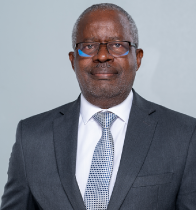
Rev. Prof. Dr. Samuel Luboga

Prof. Kelli O’Laughlin

Jonathan Izudi, MPH, MSc, Ph.D.
He is an NIH Emerging Global Leader and University of California TB Research Advancement Center (UC TRAC) Global Fellow at UCSF. His specialties are in public health and global health. After nearly 11 years of work in HIV, TB, and maternal and child health programs at the national and international levels, he chose a research career path, completing his doctoral studies in 2021 and producing 10 publications (9 pre-graduation vs. 1 post-graduation). He then completed postdoctoral training in HIV and co-infections (IDI Makerere University, Uganda), global health (UCSF, USA), and impact evaluation (UC Berkeley, USA). He largely researches TB and HIV through epidemiological, operational, and implementation research lenses. His methodological and statistical expertise is in systematic reviews and meta-analyses, causal inference, and impact evaluation using randomized and non-randomized approaches. He has presently authored 82 peer-reviewed articles (36 first-authored) and is ranked among the top 150 research scientists in Uganda.
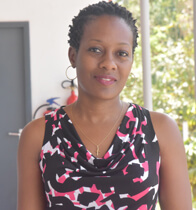
Dr. Christine Sekaggya-Wiltshire, MBChB, MMED, Ph.D., FCP (ECSA)
Dr. Christine Sekaggya is an internal medicine physician with a PhD in TB drug pharmacokinetics. Her research interests are in drug pharmacokinetics and non-malignant haematology like thrombosis and sickle cell disease. She is an investigator in pharmacokinetic studies, clinical trials, studies related to drug-drug interactions, dosing studies and other research projects related to HIV, tuberculosis and haematological disorders.
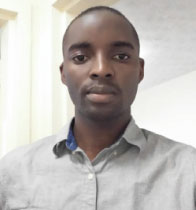
Ronald Galiwango, MPhil, PhD
Ronald Galiwango (PhD) is a bioinformatics and data scientist at the African Center of Excellence in Bioinformatics and Data Intensive Sciences (ACE-Uganda) within Makerere University’s Infectious Diseases Institute in Kampala. After earning First-Class Honors in Mathematics and Statistics from Makerere University in 2013, he received a Commonwealth Fellowship for an MPhil in Computational Biology at the University of Cambridge in 2014. In 2016, he pursued a PhD in Computational Epidemiology (Bioinformatics, Epidemiology) at the University of Georgia, USA, funded by a Fogarty-NIH Fellowship, and enhanced his data science skills through DataCamp. His research focuses on data science, computational biology, bioinformatics, and mathematical modeling, particularly in Antimicrobial Resistance (AMR). He has a strong commitment to training and mentorship, teaching courses on the MSc/PhD Bioinformatics program at Makerere University, supervising graduate students, and participating in various training programs.
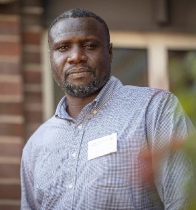
Francis Williams Ojara, BSc, MSc, Dr. ret. Nat
Francis Williams Ojara, BSc, MSc, Dr. ret. Nat
Francis Williams Ojara is a Post-doctoral pharmacometric modeler at the Infectious Diseases Institute and a lecturer of pharmacology at Gulu University. He holds a Doctorate in Natural Sciences (focusing on Pharmacometrics). His research covers modelling of pharmacokinetic-(and pharmacodynamic) data in oncology and infectious diseases, with current interests in understudied populations such as the pediatrics and pregnant mothers. He has strong interest in training and mentoring scholars into pharmacometrics and establishing potent global networks to support the growth of pharmacometrics in Uganda and Africa.
Google Scholar: https://scholar.google.com/citations?user=Wc77s50AAAAJ&hl=en
LinkedIn: https://www.linkedin.com/in/ojara-williams-francis-38993822
X: https://twitter.com/fwojara
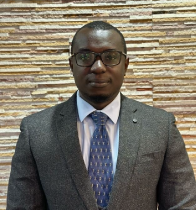
Rodgers Rodriguez Ayebare, MB. ChB, DTM&H, CIC, MSc
Rodgers Rodriguez Ayebare, MB. ChB, DTM&H, CIC, MSc, is a sepsis clinician, infection preventionist, and infectious diseases scientist with extensive experience in advanced infection control and international program management. He currently manages the Africa CDC’s implementation science and pharmacovigilance workstreams under the Saving Lives and Livelihoods initiative. As the lead for vaccines and medical countermeasures at the Global Health Security Department of the Infectious Diseases Institute, Makerere University, he also serves as a technical advisor to Uganda’s Ministry of Health, specializing in outbreak preparedness, infection control, and case management for Ebola and COVID-19.
Event Speakers

Prof. Nelson K. Sewankambo, MBChB, MMed, MSc, FRCP, LLD (Hon)
He is a Professor Emeritus and a former Dean of Makerere Medical School, and a past Principal Makerere University College of Health Sciences. He facilitated the establishment of many collaborations between Makerere University and institutions in both high and low or middle-income countries. He was a member of the research team that for the first time identified and documented the existence of HIV in Uganda in early 80’s (Lancet, 1985). He is one of the founders of the internationally reknown Rakai Health Sciences Program (RHSP), initially known as the Rakai Project which has a longitudinal population Rakai HIV Community Cohort Services (RCCS) for the last 35 years. RHSP has generated research evidence used in global (WHO), regional and national HIV prevention and management policies. He is one of the founders of the world famous 20-year old Infectious Diseases Institute (IDI) at Makerere University. IDI has very strong HIV prevention, research, management and care programmes for the last 20 years. He was a founder and is a scientific adviser (20+ years) of the Makerere-University Walter Reed Research Institute (MUWRP) and a founding member and Board Chair of the Makerere Joint AIDS Program (MJAP) in Uganda. He has focused on epidemiological and interventional HIV/AIDS research and also contributed to building indigenous research capacity to conduct quality research relevant to the country, region and globally.

Prof. Yuka Manabe, M.D.
Dr. Yukari Manabe is a Professor in the Division of Infectious Diseases in the Department of Medicine with secondary appointments in the Bloomberg School of Public Health Department of International Health and the Department of Microbiology and Molecular Immunology at Johns Hopkins University. She is also the Associate Director of Global Health Research and Innovation. Dr. Manabe obtained her undergraduate degree from Yale University and her M.D. from Columbia University College of Physicians and Surgeons. After completing both her residency in Internal Medicine and fellowship in Infectious Diseases at Johns Hopkins Hospital, she joined the faculty in 1999.
Dr. Manabe began her career working on the basic science aspects of tuberculosis (TB) immunopathogenesis in comparative animal models of infection, particularly latency, reactivation, and immune reconstitution inflammatory syndrome (IRIS) in the rabbit model within the Johns Hopkins Center for Tuberculosis Research. In 2007, she was seconded to the Infectious Diseases Institute (IDI) at Makerere College of Health Sciences as the Associate Medical Laboratory Director of the College of American Pathologists certified Makerere University-Johns Hopkins University Clinical Core Lab to study antiretroviral associated TB and IRIS. She then became the Head of Research at the IDI in 2008 until 2012 where she built research capacity and infrastructure for training Ugandan investigators.
Dr. Manabe has been doing operational and translational research in tuberculosis and HIV co-infection. She is particularly interested in rapid, point-of-care infectious disease diagnostics suitable for the resource-limited settings. Her research has focused on accuracy testing of various rapid, point-of-care diagnostics for HIV-related infections and sexually transmitted diseases.

Anastacia Nabyonga Sebbowa
Anastacia is a third year undergraduate student pursuing a Bachelor of Medicine and Bachelor of Surgery at Makerere University College of Health Sciences. She holds a Bachelor of Science in Biomedical Sciences.
She aspires to become an epidemiologist because she believes that every health challenge has layers beneath it and that that these layers should be tackled separately.

Timothy R. Muwonge, MBChB, MPH
Dr. Timothy Muwonge is a Public Health and Infectious Diseases Specialist and the Head of Programs at the Makerere University Infectious Diseases Institute- Kasangati, Uganda.
He is a member of the Uganda National HIV Prevention technical working group at the Ministry of Health. He completed his degree in medicine and surgery from the Mbarara University of Science and Technology in Western Uganda and MPH from School of Public Health, Makerere University. Over the past 12 years, Dr. Muwonge has worked closely with a team of researchers at International Clinical Research Center at the University of Washington and Harvard Medical School on a number of HIV prevention trials and has co-authored over 18 papers in peer reviewed journals. He is currently working on HIV care and prevention studies among key and vulnerable populations including refugees.

Dr. Andrew D Kambugu, MBChB, MMED (Internal Medicine), FRCP (London)
He is the Executive Director of IDI and previously was the Head of Research Program at IDI. Dr. Kambugu is also an adjunct Assoc. Prof. at the University of Minnesota, USA, is an honorary Senior Lecturer in the Dept. of Medicine MakCHS. He is a medical doctor with a Masters in Internal Medicine from Makerere University. He also has specialist training in infectious diseases from the Universities of Utah and Manitoba; and is a Fellow of the Royal College of Physicians, UK. In his other roles, Dr. Kambugu is the Chair, Uganda Society for Health Scientists Board and Vice President of the Researchers for Global Health (R4GH) group. Dr. Kambugu also served as the Prevention, Care and Treatment (PCT) programme lead at IDI for seven years before leading the Research program. He has over 14 years of HIV clinical and programming experience and is a member of two national HIV subcommittees of the Ugandan Ministry of Health. He has made significant research contributions in the areas of antiretroviral.

Dr. Rosalind Parkes-Ratanshi MBBS, Ph.D., FCRP, FFPH.
Director Academy for Health Innovation in Uganda at IDI. She is a medical doctor with an interest in innovations, research and development. She is PI on a medical drones project as well as evaluation of Call for life interactive voice response. She also holds a joint appointment as Principal Research Associate in Clinical School, Cambridge University UK and is Chair Board of Directors, Aga Khan Health Services, Uganda.

Prof. David Meya, MBChB, MMED, Ph.D.
Dr. David Meya is an Associate Professor of Medicine at Makerere University College of Health Sciences and an Adjunct Associate Professor at the University of Minnesota. He has been involved in clinical research of central nervous system infections and complications, with a focus on HIV Immune Reconstitution Inflammatory syndrome (IRIS). Dr. Meya has led epidemiological and translational research studies as well as randomized clinical trials in prevention and treatment of Cryptococcal Meningitis. Dr. Meya also has a specific interest in public health interventions to prevent meningitis at population level. He has advocated for cryptococcal antigen (CrAg) screening as a strategy to reduce deaths and hospitalizations from cryptococcal meningitis. Dr. Meya chairs the Advanced HIV Disease Technical Working group at the Ministry of Health. He has been the Principal Investigator on NIH R01, CDC U01, and UK MRC grants and continues to be involved in advocacy to improve clinical care and outcomes in a predominantly HIV-infected patient population with limited resources for health focusing on advanced HIV disease.

Dr. Barbara Castelnuovo, MD, Ph.D.
She is a clinician trained at the University of Milan, and based in Uganda since 2002; she started working at IDI in 2004 as a senior medical officer and contributed to best practices in the scale up of ART in Uganda
She is the current Head of Research at IDI and the Head of capacity building supervising several scholars from Makerere University and international collaborating institutions. She is the recipient of a senior fellowship from EDCTP on HIV, NCD and aging.

Dr. Stella Zawedde-Muyanja, MBChB, MPH, PhD
Dr. Stella Zawedde-Muyanja is a research scientist with interest in Implementation Science. Her work is focused on using implementation research to improve delivery of TB care services in Uganda. She currently works with the Infectious Diseases Institute as Senior Operations Research Advisor to IDI’s USAID healthcare improvement projects in Karamoja and Kampala. In this role, she provides technical support for the development and conduct of various implementation research studies. She has also been Principal Investigator and Co-Principal Investigator on various research studies within the IDI funded by the WHO STOP TB Partnership, and the NIH.

Prof. Catriona Waitt, BSc (Hons), MBChB (Hons), MRCP, PhD, DTM&H, PG Cert (Teaching)
Prof. Catriona Waitt is a clinical pharmacologist from the University of Liverpool who has been at IDI since 2014 undertaking a Wellcome Clinical Research Career Development Fellowship. Her research interests are the dosing and safety of drugs in special populations who cannot be easily studied in conventional clinical trials, including pregnant and breastfeeding women and their infants, children and adolescents, patients with severe intercurrent illnesses and potentially interacting medications and vulnerable patients in outbreak settings. Her research programme encompasses intensive pharmacokinetic studies, clinical trials and sparse data collection from vulnerable populations with pharmacokinetic modelling to explore differences in drug exposure between individuals and populations.

Dr. Christine Sekaggya-Wiltshire, MBChB, MMED, Ph.D., FCP (ECSA)
Dr. Christine Sekaggya is an internal medicine physician with a PhD in TB drug pharmacokinetics. Her research interests are in drug pharmacokinetics and non-malignant haematology like thrombosis and sickle cell disease. She is an investigator in pharmacokinetic studies, clinical trials, studies related to drug-drug interactions, dosing studies and other research projects related to HIV, tuberculosis and haematological disorders.

Dr. Aggrey S. Semeere is a Ugandan trained Physician and Researcher based at IDI. He obtained his qualification in Internal Medicine from Makerere University, and Epidemiology with Implementation science training from the University of California, San Francisco. He is involved in various research projects that revolve around the epidemiology of chronic co-morbidities (especially cancer and cardiovascular disease) among HIV-infected individuals on antiretroviral therapy. His research focuses on prevention and early detection of co-morbidities (e.g. Kaposi’s sarcoma and Hypertension) using advanced epidemiological methods and implementation science based approaches.

Dr. Ronald Galiwango, MPhil, Ph. D.
Dr. Ronald Galiwango is a Bioinformatics scientist at IDI, with a doctorate degree in Epidemiology and Bioinformatics from the University of Georgia, USA and an MPhil in Computational Biology from the University of Cambridge, UK. His work focuses on using bioinformatics and computational biology approaches to answer epidemiology research questions as well as biomedical and public health problems. These approaches include; big data analytics, data science, advanced statistical methodology, genome informatics, machine learning, mathematical modelling and simulation. He also has a strong passion for training and mentorship having benefited from such. He believes in building a critical mass of quantitative scientists in the country so as to redress the capacity gap in the country and Africa at large; and to perform and complete projects with immediate relevance to national and regional health issues.

Prof. Ponsiano Ocama, MBChB, MMED, PhD, FCP (ECSA)
Dr. Ponsiano Ocama is an Associate Professor and academic hepatologist at Makerere University in Kampala, Uganda, where he supervises the clinical services for GI/hepatology at Kiruddu National Referral and Teaching Hospital. Ponsiano’s major research interests are the interactions between viral hepatitis and HIV on liver disease and hepatocellular carcinoma in resource-limited settings. In many parts of sub-Saharan Africa, hepatitis B infection is endemic and generalized HIV epidemics exist. Understanding the consequences of co-infection including hepatocellular carcinoma is crucial to inform approaches for targeting screening or secondary prevention with antiviral therapy. Currently we have been involved in studying obesogenic effect of dolutegravir in HIV infected patients. In addition, we have run studies on liver cancer and HIV, impact of schistosoma mansoni infection in HBV infected patients on development of HCC.

Mr. Allan Buzibye, MSc, BBLT
With the Forgarty D43 award, Allan is a PhD student at the Infectious Diseases Institute. He is a laboratory scientist who graduated from Makerere University with a master’s in pharmacology. Allan has eleven years of experience in chromatographic tests, including method development and validation, for determining drug concentrations in human matrices. His extensive knowledge of drug analysis is a result of his training at Radboud University in Nijmegen, the Netherlands, the University of Liverpool in the United Kingdom, and the University of Zurich in Switzerland. As part of his PhD, he also received training at the cutting-edge molecular laboratory at the Johns Hopkins School of Medicine, the University of San Francisco in California, and Harvard. In addition to his Doctorate, he is currently supporting several pharmacokinetic investigations at the Infectious Diseases Institute.

Prof. Ponsiano Ocama, MBChB, MMED, PhD, FCP (ECSA)
Dr. Ponsiano Ocama is an Associate Professor and academic hepatologist at Makerere University in Kampala, Uganda, where he supervises the clinical services for GI/hepatology at Kiruddu National Referral and Teaching Hospital. Ponsiano’s major research interests are the interactions between viral hepatitis and HIV on liver disease and hepatocellular carcinoma in resource-limited settings. In many parts of sub-Saharan Africa, hepatitis B infection is endemic and generalized HIV epidemics exist. Understanding the consequences of co-infection including hepatocellular carcinoma is crucial to inform approaches for targeting screening or secondary prevention with antiviral therapy. Currently we have been involved in studying obesogenic effect of dolutegravir in HIV infected patients. In addition, we have run studies on liver cancer and HIV, impact of schistosoma mansoni infection in HBV infected patients on development of HCC.

Dr. Andrew Mujugira, MBChB, MSc, MPH, PhD
He is a Senior Research Scientist at Makerere University Infectious Diseases Institute and Affiliate Assistant Professor of Global Health at the University of Washington. He has 18 years of experience conducting HIV prevention clinical trials in East and Southern Africa. This research successfully supported evidence-based HIV policy change at global and country level. He has served as Principal Investigator and Co-Investigator on several NIH-funded PrEP effectiveness trials, demonstration projects and implementation studies among underserved and vulnerable key populations in Uganda. These projects are evaluating the use of combination HIV prevention tools (HIV self-testing, STI self-sampling, PrEP and antiretroviral treatment) with the goal of reducing HIV incidence.

Prof. Pauline Byakika-Kibwika. MBChB, MSc, MMed, PhD, FRCPE
I am a Professor of Medicine and an Epidemiologist, sub specialized in infectious diseases. I am the head of Department of Medicine at Makerere University College of Health Sciences. I graduated with a Bachelor of Medicine and Bachelor of Surgery, a Master of Science in Clinical Epidemiology and Biostatistics, and a Master of Medicine in Internal Medicine, from Makerere University. I hold a Doctor of Philosophy in Clinical Pharmacology from Trinity College Dublin, Ireland and completed post-doctoral studies. My clinical and research work culminated into my election as a Fellow of the Royal College of Physicians of Edinburgh and the Uganda National Academy of Sciences respectively.
My early research career started with investigating antimalarial drug efficacy and the effect of HIV-infection on antimalarial treatment outcomes in HIV infected individuals. I was selected as one of 5 Sewankambo Scholars, a prestigious scholarship program named after one of Uganda’s most distinguished researchers, aimed to develop independent Principal Investigators in Uganda. Since then I have written successful research grants as Principal Investigator, conducted and managed research and capacity building projects, including clinical trials. I have published in peer reviewed journals, mentored and supervised post graduate and PhD students’ research.
My PhD research focused on optimizing treatment for HIV and malaria and strengthening biomedical research capacity through the establishment of a clinical pharmacology research laboratory at the Infectious Diseases Institute (IDI), where I conducted research to investigate pharmacokinetic profiles and drug interactions of antiretroviral and antimalarial drugs. My post-doctoral studies were funded by the prestigious 3-year EDCTP1 Senior Fellowship, for which I performed a randomised clinical trial to investigate treatment options for severe malaria in children and provided leadership to a team of national trainers on management of severe malaria and its complications. Successful completion of this research work facilitated me to win another prestigious award of the 5-year EDCTP2 Senior Fellowship for which I am currently evaluating strategies for optimizing malaria treatment for HIV-Malaria co-infected individuals.
I lead the research directorate at the Department of Medicine and previously served as a member of the scientific review committee at the IDI for over 15 years. I served as a member of the pioneer accreditation committee for research ethics committees (RECs) in Uganda. I have led a number of capacity building grants including the recently concluded NIH funded 1G11TW011309-01 grant, that focussed on building local expertise of RECs in reviewing research protocols with complex and emerging study designs. I recently won the HORIZON-JU-GH-EDCTP3 grant to scale up this work in the East African region.
I am a member of the Uganda Ministerial Scientific Advisory Committees on COVID-19, Malaria and Ebola. I serve on several advisory boards and committees and I am a Commissioner on the East African Health Research Commission.

Mr. Denis Omali, BBLT
Denis is a Fogarty fellow finalising his MSc. Pharmacology at Makerere University with support from the Fogarty International Center of the National Institutes of Health under Award Number D43TW009771. Denis also holds a certificate in Laboratory Quality Management Systems from ASCP and a certificate in Health System Strengthening from the University of Melbourne. For the past six years, Denis has been trained and mentored by Mr. Allan Buzibye in the area of pharmacokinetics assay method development, optimisation and validation to support TDM in the clinical pharmacology laboratory at IDI. He is also interested in pharmacogenomics of drugs used in infectious diseases and wishes to translate insights from this area to understand influence of pathogen genomics in infectious diseases management.

Dr. Richard Kwizera, BSc, MSc, MSc (UK), PhD
Richard Kwizera is a medical mycologist and Laboratory Manager in the research department at the Infectious Diseases Institute, College of Health Sciences, Makerere University. He has a special research interest in diagnostics, epidemiology and management of pulmonary and opportunistic fungal infections. He has experience and skills in HIV, TB and fungal disease diagnosis and management as well as participation in clinical trials. He is a member of the Makerere fungal group investigating the outcomes of HIV patients with cryptococcal meningitis. He is attached to the research team evaluating the incidence of chronic pulmonary aspergillosis in HIV patients with past TB. He is a co-founder of the Fungal Interest Group Uganda. He is a member of the Global mycetoma working group. He is a member of the ISHAM Pan African fungal working group. He holds a master’s of science in Biomedical Laboratory Sciences and management from Makerere University and a master’s of science in Medical mycology from the University of Manchester. He has recently completed his PhD investigating the burden of fungal asthma in Africa attached to the African Severe Asthma Program. He has a goal of developing translational research in Uganda and across the East African region.

Mr. Francis Kakooza, Deputy Head, Global Health Security Department at the Infectious Diseases Institute
Francis Kakooza is a PhD candidate in Molecular Epidemiology at Makerere University, with a background training in Biomedical Laboratory Sciences and International Infectious Diseases Management.
Francis Kakooza is currently serving as the Deputy Head, Global Health Security Department at the Infectious Diseases Institute, Makerere University. He is also the Program Director for the Implementation Science Pillar for COVID-19 vaccination in Africa [with coverage of 15 Africa Union member states].
Previously, he has served in different capacities as the Technical Advisor for Antimicrobial Resistance and the Program Manager for the UK-funded Fleming Fund Country Grants at IDI.
Francis has over ten years’ experience in conceptualizing, designing and implementing public health interventions on laboratory systems, antimicrobial resistance, one-health, vaccination, surveillance, biosafety and biosecurity.
He is also an honorary lecturer at Makerere University, Pharmacy Department, a technical member of the Sudan Ebola-Virus sequencing team at Ministry of Health and a WHO expert for global STI guidelines development.
Francis has 14 peer-reviewed publications in the global health security space, has presented a key-note address at the first Uganda National AMR symposium and member on different national and international health committees.

Dr. Rita Makabayi-Mugabe, MBChB, MPH, PGD PPM.
Dr. Rita Makabayi-Mugabe is a Medical Doctor and Public Health Specialist with vast experience in clinical care, in-service clinical capacity building for health workers, and research in tuberculosis (TB) and HIV programs. She is passionate about improving health service delivery to patients and communities around the world and making a significant contribution to their well-being through research. She currently works with the Infectious Diseases Institute as Operational Research Coordinator under the USAID Local Partner Health Services -TB Activity.

Prof. Miriam Nakalembe – Ivudria, MBChB, MMED (OBGYN), Ph.D.
Prof. Miriam Nakalembe is an Associate Professor of Medicine in the Department of Obstetrics and Gynaecology at Makerere University College of Health Sciences as well as a clinical researcher in the area of cervical cancer diagnosis and prevention. She is leading a study in the community using self-collection of vaginal samples for HPV testing, and a project to develop a smartphone confocal endoscope to diagnose suspected cervical lesions. She is part of the cervical cancer prevention task group at the Uganda Ministry of Health. She is one of the lead consultants on the Clinton Health Access Initiative (CHAI) and Global Fund pilot projects introducing HPV self-testing in ART clinics of regional referral hospitals. Currently, she is one of the technical consultants on the CDC-supported National rollout of cervical cancer screening in over 640 health facilities. Miriam supports other research projects in the area of obstetrics. She is a co-Investigator on the PROMOTE studies with IDRC exploring the prevention of malaria in pregnancy. She has also been involved in clinical trials supported by WHO and Pfizer pharmaceuticals among pregnant women.
